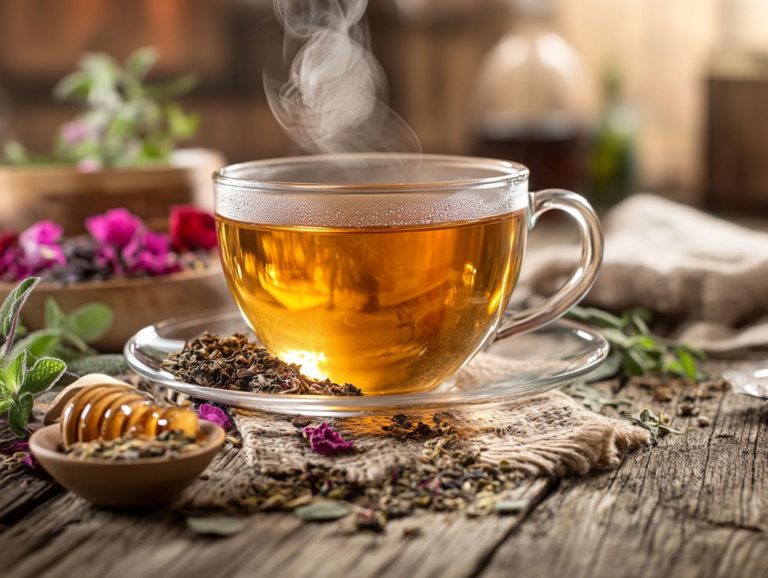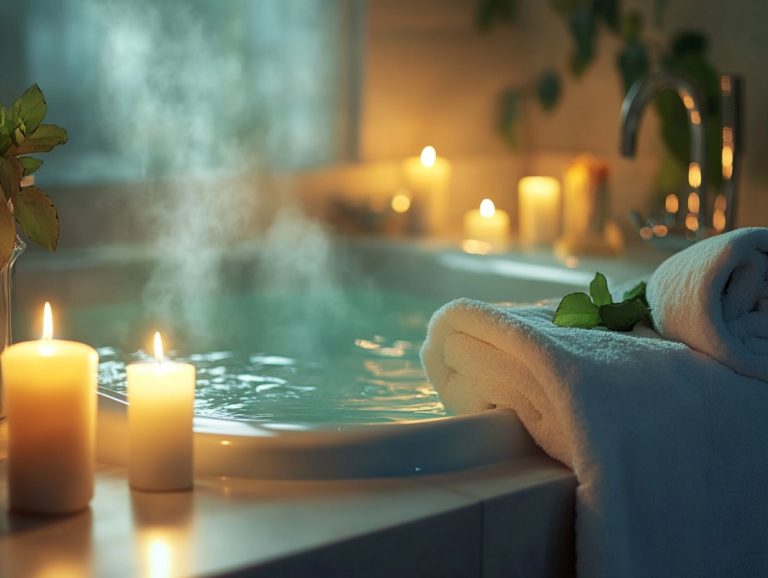Understanding the Relaxation Response
In today s fast-paced world, stress often seems like an unavoidable reality. However, there s a compelling remedy: the Relaxation Response.
Discover how the Relaxation Response can transform your life! This article explores what the Relaxation Response entails, offering techniques for its induction and highlighting the myriad benefits it provides for both physical and mental well-being.
You ll also explore the scientific research backing its effectiveness and gain practical tips on seamlessly integrating this practice into your daily life.
Uncover how simple techniques can turn your stress into a state of tranquility.
Contents
- Key Takeaways:
- What is the Relaxation Response?
- How to Induce the Relaxation Response
- Benefits of the Relaxation Response
- Research on the Relaxation Response
- Incorporating the Relaxation Response into Daily Life
- Frequently Asked Questions
- What is the relaxation response?
- How does the relaxation response affect the body?
- What are some techniques for inducing the relaxation response?
- Can the relaxation response improve mental health?
- How often should I practice the relaxation response?
- Are there any potential risks associated with practicing the relaxation response?
Key Takeaways:

- The relaxation response is a natural state of calm that you can create through various techniques.
- Practicing the relaxation response regularly improves your physical and mental health.
- Studies show that practicing this response leads to a more balanced and relaxed life.
What is the Relaxation Response?
The Relaxation Response is a scientifically validated state of deep relaxation that effectively counters your body s natural fight-or-flight reaction. Developed by Dr. Herbert Benson at Harvard Medical Institute, this response plays a crucial role in alleviating symptoms associated with stress-related disorders like anxiety, hypertension, and cardiovascular disease. It fosters a profound sense of well-being and tranquility.
By employing various techniques, you can access this state, paving the way for significant enhancements in both your mental and physical health.
Definition and Background
The Relaxation Response, introduced by Dr. Herbert Benson, represents your body’s remarkable ability to enter a state of deep relaxation, a stark contrast to the stress-induced fight-or-flight response. This serene state nurtures your emotional well-being and triggers beneficial physical changes in your body that contribute to your overall health.
Dr. Benson discovered that by engaging in focused meditation practices, you can significantly lower your heart rate and enhance your immune function. His groundbreaking research revealed how techniques like mindfulness and various forms of meditation cultivate this response, building your resilience against stress.
Over time, we’ve learned more about the Relaxation Response, leading to its incorporation into a variety of therapeutic practices. With the science of breathing and relaxation supporting it blossoming, its significance in holistic health remains deeply impactful.
How to Induce the Relaxation Response
Inducing the Relaxation Response encompasses a range of techniques designed to enhance your well-being. From breathing exercises and visualization methods to energy healing practices and muscle relaxation strategies, these approaches can seamlessly blend into your daily routine, enriching your life with tranquility and balance.
Techniques and Methods

Breathing techniques and visualization methods, such as body scan meditations and yoga practices, are essential tools for successfully inducing the Relaxation Response.
Among these effective strategies, diaphragmatic breathing deep breathing that comes from your abdomen instead of your chest truly shines for its ability to significantly reduce stress levels. By focusing on deep breaths, you can actively tap into your body’s relaxation pathways.
Progressive muscle relaxation further aids in releasing tension, fostering a deep connection between your mind and body. Guided imagery enhances this practice by allowing you to visualize calming scenarios, soothing your nervous system in the process.
To seamlessly integrate these techniques into your daily routine, dedicating just a few minutes each day can yield remarkable benefits, promoting your overall well-being and a healthier response to stress.
Don’t wait to experience the benefits! Start practicing these techniques today for a calmer, more balanced you!
Benefits of the Relaxation Response
The Relaxation Response presents a wealth of benefits, including notable stress reduction, enhanced mental clarity, and a general improvement in health. This makes it an exceptionally effective intervention for managing chronic stress and anxiety disorders.
Imagine a life with less stress! Embracing this approach can lead to transformative changes in your well-being.
Physical and Mental Health Benefits
The physical and mental health benefits of the Relaxation Response are impressive. These include a reduced risk of cardiovascular disease, relief from anxiety disorders, and improved management of gastrointestinal issues.
This approach effectively lowers cortisol levels, the hormone linked to stress, which can disrupt overall health. Numerous studies reveal that regularly engaging in relaxation techniques like meditation and deep breathing not only helps lower blood pressure but also cultivates a calm state that enhances emotional well-being, as explained in the science of relaxation.
Research published in reputable journals has shown significant decreases in both blood pressure and anxiety levels among participants who consistently practiced these techniques. By embracing the science behind the relaxation response, proactive support for health is possible, paving the way for a more balanced and resilient lifestyle.
Research on the Relaxation Response
Numerous scientific studies, including important research published in the Public Library of Science ONE, have underscored the effectiveness of the Relaxation Response in alleviating stress and enhancing overall well-being, as noted by the esteemed Benson-Henry Institute.
Scientific Studies and Findings

Scientific studies conducted at the Benson-Henry Institute present compelling evidence that the Relaxation Response is a powerful ally in reducing stress and enhancing overall well-being.
In one noteworthy study, participants engaged in mindfulness meditation and deep breathing exercises over eight weeks. The results? A significant drop in cortisol levels, that pesky primary stress hormone.
The randomized controlled trial employed pre- and post-intervention assessments, utilizing both self-reported stress scales and physiological measures to capture the full impact of the Relaxation Response techniques.
The findings highlighted improvements in emotional regulation and cognitive performance, indicating that consistent practice could lead to lasting health benefits.
These results align with a wealth of scientific literature that champions relaxation practices as effective tools for stress management, underscoring their vital role in enhancing overall health outcomes.
Incorporating the Relaxation Response into Daily Life
Incorporating the Relaxation Response into daily life can be easily achieved through practical tips and consistent practices.
Embrace mindfulness, tai chi, qi gong, and yoga as integral parts of your routine. This approach allows ongoing stress management and enhances overall well-being.
Tips for Maintaining a Relaxation Practice
To maintain a robust relaxation practice, establishing consistency is key. Incorporating relaxation techniques and mindfulness into a daily routine is essential.
Schedule specific times throughout your week dedicated exclusively to relaxation. Experiment with various methods such as meditation, deep breathing exercises, and understanding the neuroscience of relaxation to significantly elevate your experience. Engaging in these techniques not only calms the mind but also restores balance within the body.
Seeking out supportive communities, whether online or in-person, presents a valuable opportunity to share experiences and gather insights. This connection fosters a richer and more sustainable approach to relaxation, enhancing overall well-being.
Frequently Asked Questions
Start today! Take a few minutes to practice a relaxation technique.
In summary, embracing the Relaxation Response can lead to numerous benefits for both physical and mental health, making it a vital practice for stress management.
What is the relaxation response?

The relaxation response is a natural state of deep rest. It features a slower heart rate, reduced breathing, and less muscle tension.
How does the relaxation response affect the body?
The relaxation response lowers blood pressure and improves digestion. It also helps reduce muscle tension and slows heart and breathing rates.
What are some techniques for inducing the relaxation response?
Techniques to induce the relaxation response include deep breathing and meditation. You can also try yoga, progressive muscle relaxation, and guided imagery.
Can the relaxation response improve mental health?
Yes, the relaxation response effectively reduces anxiety and depression symptoms. It alleviates stress, improves mood, and fosters a positive outlook on life.
How often should I practice the relaxation response?
How often you practice the relaxation response varies by individual. Some may benefit from daily practice, while others might only need it a few times a week, incorporating mindfulness and breathing techniques.
Tune into your body s needs and make relaxation a joyful part of your routine!
Are there any potential risks associated with practicing the relaxation response?
The relaxation response is generally safe and has no known negative side effects. However, consult your healthcare provider if you have a pre-existing medical condition.
Practice in a safe and comfortable environment to maximize benefits.






